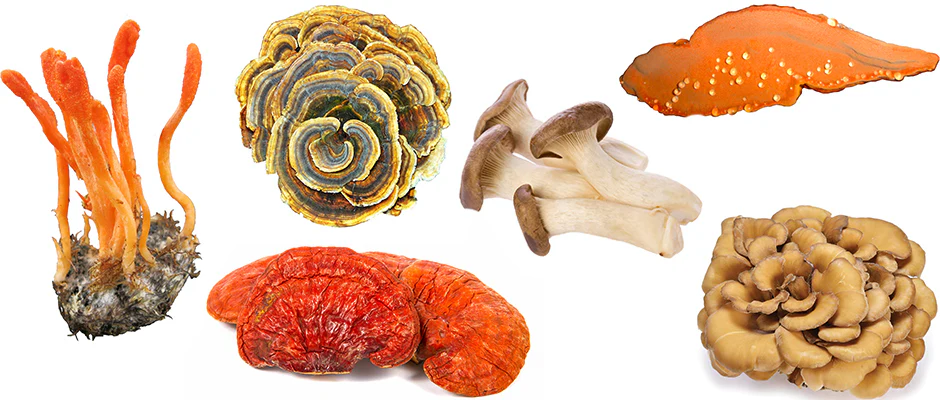Cannabis, CBD, Ketamine, Magic Mushrooms
Medicinal Mushrooms vs. Culinary Mushrooms: What’s the Difference?
When most people think of mushrooms, they picture the familiar white buttons or brown creminis found in grocery store aisles or topping a pizza. But beyond the kitchen, a whole category of mushrooms has been used for centuries in traditional healing systems — medicinal mushrooms. While they may look similar to their edible cousins, medicinal mushrooms serve a very different purpose in the world of wellness and health.
So, what exactly sets medicinal mushrooms apart from culinary mushrooms? Let’s break it down.
What Are Culinary Mushrooms?
Culinary mushrooms are the common edible mushrooms used primarily for flavor, texture, and nutrition in cooking. They are appreciated for their umami taste, low-calorie content, and essential nutrients.
Common Culinary Mushrooms:
- Button (White) Mushrooms
- Portobello
- Cremini
- Shiitake (used both culinarily and medicinally)
- Oyster Mushrooms
- Enoki
- King Trumpet
Nutritional Benefits:
Culinary mushrooms are a good source of B vitamins, fiber, selenium, potassium, and antioxidants. They add depth and heartiness to dishes and are valued in plant-based cooking as a meat substitute.
However, while they’re nutritious, culinary mushrooms are not typically used for therapeutic or medicinal purposes unless specifically processed or extracted in certain ways.
What Are Medicinal Mushrooms?
Medicinal mushrooms (also referred to as functional mushrooms) contain bioactive compounds that go beyond nutrition and offer potential therapeutic health benefits. These mushrooms are often consumed as powders, capsules, tinctures, or teas — not necessarily for taste, but for their ability to support the immune system, reduce stress, boost cognition, and improve overall wellness.
Common Medicinal Mushrooms:
- Reishi (Ganoderma lucidum) – for stress, immunity, sleep
- Lion’s Mane (Hericium erinaceus) – for brain health, memory, focus
- Cordyceps (Cordyceps militaris/sinensis) – for energy and performance
- Chaga (Inonotus obliquus) – for antioxidants and inflammation
- Turkey Tail (Trametes versicolor) – for immune modulation
- Maitake and Shiitake – also used medicinally for immune support
Key Health Benefits:
Medicinal mushrooms are often used for their adaptogenic and immune-supporting properties. Some of the key active compounds include:
- Beta-glucans – help regulate immune responses
- Triterpenes – support stress reduction and inflammation
- Erinacines & Hericenones – promote nerve growth (especially in Lion’s Mane)
- Cordycepin – linked to increased ATP production and stamina
These mushrooms are usually not eaten raw or cooked into meals. Instead, they’re processed through hot water or alcohol extraction to concentrate their bioactive compounds.
Can a Mushroom Be Both Culinary and Medicinal?
Yes — some mushrooms bridge the gap between culinary and medicinal. Shiitake, Maitake, and Oyster mushrooms are excellent examples. They are flavorful, widely used in cooking, and also contain beneficial compounds like beta-glucans that support the immune system.
However, to get the full medicinal benefits, these mushrooms often need to be consumed in higher concentrations or specialized extracts, rather than just as part of a meal.
How Are They Used Differently?
| Aspect | Culinary Mushrooms | Medicinal Mushrooms |
| Purpose | Flavor, nutrition, texture | Therapeutic, immune & stress support |
| Consumption | Cooked, sautéed, grilled, or raw | Capsules, powders, tinctures, teas |
| Bioactive Focus | General nutrients (B vitamins, minerals) | Beta-glucans, triterpenes, ergothioneine, etc. |
| Typical Use Case | In meals as vegetables or meat substitutes | As a supplement for daily wellness or specific support |
| Taste | Often mild and savory (umami) | Often bitter, earthy, or woody |
Which Should You Use?
- If you’re cooking a delicious meal and want a nutritious, plant-based addition — culinary mushrooms are perfect.
- If you’re looking to support your body’s immune health, stress response, energy, or mental clarity, adding medicinal mushrooms to your wellness routine may offer benefits beyond your plate.
You don’t necessarily have to choose one or the other — they can work together. You can enjoy shiitake mushrooms in your stir-fry while also taking a Lion’s Mane supplement for focus and cognitive support.
Final Thoughts
While they share the same fungal kingdom, culinary mushrooms and medicinal mushrooms serve very different purposes. One satisfies your palate, the other nurtures your body in subtle, powerful ways. As scientific interest in functional mushrooms grows, they’re becoming an exciting part of holistic health routines around the world.
Whether you’re exploring medicinal mushrooms to help with focus, fatigue, or immune support, or just enjoying a savory mushroom risotto, there’s no denying that mushrooms are among nature’s most versatile gifts.

